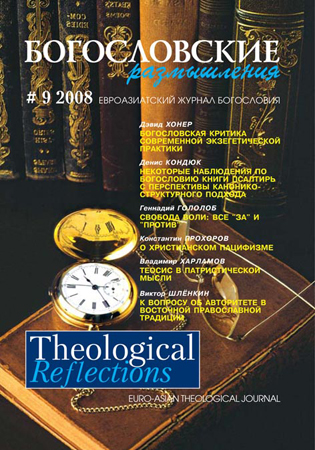Free Will: Pro and Con
Keywords:
Free will, biblical teaching on human free will, theological determinism, unconditionally arbitraryAbstract
Gennady Gololob’s article, “Free Will: Pro and Con” is dedicated to the theme of the possibility and conditions for the manifestation of human free will. The basic classification of ancient and contemporary concepts of free will are presented and analyzed scientifically and theologically, together with an outline of the biblical teaching on human free will, which occupies a mediating position between the concept of theological determinism and the post-modern concept of free will as unconditionally arbitrary. The following questions are discussed: Is a human being actually free in terms of desires and behaviors, and how much? How is free will possible in a world subject to natural law, logical categories, and ethical norms? Is there agreement between human free will and divine predestination? Is free will subject to self control? What are the ways of influencing a person’s free choice? Does free will make a person a morally responsible being? How can a person make correct use of this amazing gift of God?References
- Bibliography
- А. Theological and scientific literature in Russian:
- Несмелов В.И. Наука о человеке: В 2 т. Казань, 1898-1906 (репринт – 1994).
- Олсон Г. Моральное правление Бога. СПб, 1994.
- Форлайнс Ф.Л. Библейская систематика. СПб: Библия для всех, 1996.
- Шенк Р. Жизнь в Сыне. Исследование учения о неотступности. СПб: Библия для всех, 2000.
- Пикирилли Р.Е. Кальвинизм, арминианство и богословие спасения. СПб: Библия для всех, 2002.
- Корнер Д.Д. Вечное спасение на условии веры. Верлаг (Германия): Титул, 2003.
- Гололоб Г.А. Свобода воли: между рабством и произволом. СПб: Библия для всех, 2008.
- Прист С. Теории сознания. М., 2000.
- Сёрл Дж. Открывая сознание заново. М., 2002.
- Проблема человека в западной философии: Сборник переводов. М.: Прогресс, 1988.
- Б. Theological and scientific literature in English:
- Arminius. The Writings of James Arminius, 3 volumes. Translated by James Nichols and
- W. R. Bagnall. Grand Rapids, Mich.: Baker, 1956.
- Brunner, Emil. Man in Revolt: A Christian Anthropology. Translated by Olive Wyon.
- Lutterworth, 1939.
- ____________ and Karl Barth. Natural Theology. Edited by John Bailie.
- London: Geoffrey Bles, Centenary Press, 1946.
- Jeeves, Malcolm A., R. J. Berry, and David Atkinson. Free to Be Different.
- Marshalls, 1984.
- Klein, William W. The New Chosen People: A Corporate View of Election
- (William Wade Klein, 1990).
- Midgeley, Mary. Beast and Man: The Roots of Human Nature. London: Methuen, 1980.
- Miley, John. Systematic Theology, 2 vols. Methodist Book Concern, 1892, 94;
- Reprint: Peabody, Mass.: Hendriksen, 1989.
- Pink, T. Free Will: A Very Short Introduction. Oxford: Oxford University Press, 2004.
- Scruton, Roger. An Intelligent Person's Guide to Philosophy. London: Duckworth, 1996.
- Stevens, R., ed. Understanding the Self. London: Sage, 1996.
- Trusted, J. Free Will and Responsibility. Oxford, 1984.
- Van Inwagen, P. An Essay on Free Will. Oxford, 1983.
- Watson, G. ed., Free Will. Oxford: Oxford University Press, 1982.
Downloads
How to Cite
Issue
Section
License
Copyright (c) 2020 Gennady GOLOLOB

This work is licensed under a Creative Commons Attribution-NonCommercial 4.0 International License.
All articles published in the Journal are distributed under a Creative Commons Attribution-NonCommercial 4.0 International License
By submitting an article for publication in Theological Reflections: Eastern European Journal of Theology the author grants the editors the right to publish the article and distribute it in electronic and print form.
The author reserves all copyrights and the right to use the materials of the article in whole or in part for educational purposes, to write his own dissertations, to prepare abstracts, conference reports, oral presentations, etc., as well as post electronic copies of articles (including the final electronic version downloaded from the journal’s official website) on non-commercial web-resources without the consent of the editorial board and founders.



